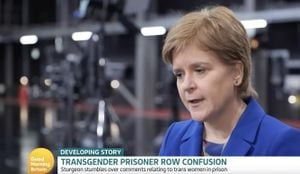South Africa’s foreign policy has evolved significantly since the dismantling of apartheid, with President Cyril Ramaphosa recently underscoring the importance of maintaining independence on the global stage. At the heart of this policy shift lies the principle of active non-alignment, which seeks to navigate the treacherous waters of international relations without being swayed by the competing interests of global powers. This approach aims to cultivate diplomatic relationships and strengthen ties with various countries without playing favorites.
On October 27, 2024, the Democratic Alliance (DA) welcomed the announcement from Minister of Home Affairs, Leon Schreiber, indicating South Africa's intent to grant visa-free access to Ukrainian diplomats holding official passports. This move was celebrated not only as an act of solidarity with Ukraine, particularly amid its struggles following Russia’s invasion, but also as a demonstration of how South Africa is positioning itself as a diplomatic authority. Ryan Smith, the DA's Deputy Spokesperson for International Relations and Cooperation, emphasized the historical bonds between South Africa and Ukraine, noting how the Eastern European nation provided refuge for numerous anti-apartheid activists.
This new policy on Ukraine starkly contrasts with the ruling African National Congress's (ANC) stance, which has been criticized for its apparent favoritism toward Russia. Under the ANC, South Africa has maintained cordial ties with the Kremlin, often labeling President Putin and Russia as valuable allies. Ramaphosa’s comments at the recent BRICS summit, where he referred to Russia as a partner without mentioning the invasion of Ukraine, received backlash for appearing too lenient. Critics argue this alignment with Russia risks jeopardizing South Africa's relationships with key Western nations.
The DA believes firm relationships with Ukraine not only reflect South Africa’s commitment to human rights but also align with the country’s constitutional values. The party's narrative is rooted deeply in the recognition of the struggles against apartheid and compares them to Ukraine’s fight for sovereignty against external aggression.
Looking back, South Africa's foreign policy during the apartheid era was marred by coercion and military aggression, often isolative and combative. Ramaphosa highlighted the shift resulting from the Freedom Charter, which envisions South Africa as a nation committed to negotiating international disputes rather than resorting to violence. This transformative vision shapes the country’s present foreign relations strategy.
Underpinning this strategy is the desire to promote peace and stability globally, as expressed by several South African leaders. Minister of International Relations and Cooperation Ronald Lamola is poised to solidify ties with Ukraine during the visit of his Ukrainian counterpart, Andrii Sybiha, where they plan to sign an agreement on visa waivers to streamline interactions between officials of both nations.
The upcoming events are especially significant as South Africa gears up for its presidency of the G20 and the scheduled South Africa-European Union summit. These platforms will enable the country to showcase its commitment to multilateralism and deepen its trade relationships, particularly with Europe, which is considered one of South Africa's major trading partners.
Despite the positive strides being made with countries like Ukraine, South Africa faces criticism for its longstanding relationships with Russia and China. Greg Mills from the Brenthurst Foundation points out the oddity of South Africa's attempts to balance these ties, as many citizens wonder what tangible benefits the relationship with Russia brings to their daily lives. Mills argues there are very few direct investments from Russia and little economic synergy, making such allegiance puzzling when South Africa's economic recovery hangs on effective global partnerships.
Mills's perspective aligns with the broader sentiment among South African citizens who are increasingly concerned about their government’s foreign policy choices, particularly as economic pressures mount at home. The calls for independence from foreign influence echo the sentiments of historical figures like Nelson Mandela, who famously resisted external pressures to align politically with any global superpower.
Speaking on behalf of ActionSA, Lerato Ngobeni recently criticized the ANC for allegedly kowtowing to foreign influence, particularly with respects to its diplomatic relations with Taiwan and China. The emphasis was on the integrity of South Africa’s international standing, advocating for the country to chart its own course rather than succumbing to pressures from powerful nations. Ngobeni's comments spotlight the internal debate surrounding how much leeway other nations should have over South Africa's foreign policy decisions.
This debate is not just academic; it is deeply rooted in the lived experiences of South African citizens. Many are questioning how their government’s foreign allegiances impact their standing on the international stage and what it means for the economy and job creation. The mining sector, for example, remains largely reliant on foreign markets, raising concerns about the strategy and sustainability of South Africa’s economic engagements.
So, where does South Africa go from here? The nation's choice seems to hinge on reconciling its revolutionary history with the current demands of global geopolitics. Moving forward, the overarching challenge will be ensuring any alliances forged do not come at the cost of rights or interests both domestically and globally. Proponents of positive change argue for peaceful engagement without compromising on core values of democracy, human rights, and state sovereignty.
While South Africa’s current administration prides itself on diplomatic relationships with both the East and West, the call for action remains prominent. Voices across the political spectrum are advocating for South Africa to reclaim its narrative as a leader of peace and stability—ideal traits underscored during the 1994 transition to democracy. A primary question to ponder is how effectively South Africa can maintain this balance without alienation or complication.
Lastly, as South Africa steps onto the global stage with renewed vigor to promote peace and equitability, the task now is to navigate these relationships responsibly. The historical legacy of solidarity among nations must not only inspire but must be the bedrock upon which future diplomatic engagements are built. Adapting to current realities, staying true to its foundational values, and ensuring pragmatic partnerships are the way forward as South Africa defines its place on the world map.



